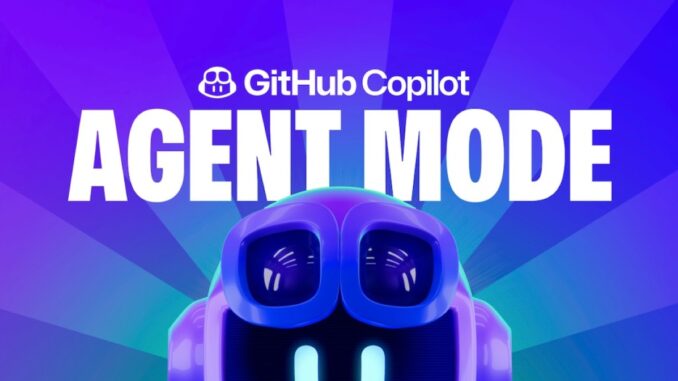
Subscribe to our daily and weekly newsletters for the most recent insights and exclusive material on industry-leading AI coverage. Discover More
Agentic AI is incredibly popular nowadays across various fields, including application development and programming.
At last, GitHub has entered the agentic AI arena with the introduction of GitHub Copilot agent mode. The promise of agentic AI in software development revolves around empowering developers to produce more code using merely a basic prompt. The new agent mode will allow Copilot to modify its own code and rectify errors autonomously. Looking ahead, GitHub is also offering a sneak peek of a completely autonomous software engineering agent, Project Padawan, which can independently manage entire development assignments.
The fresh agentic AI functionalities represent the most recent advancement in the multi-year progression of the AI-driven coding development realm that GitHub was instrumental in establishing. The Microsoft-owned GitHub initially showcased GitHub Copilot in 2021, with general accessibility following in 2022. In the realm of AI, that feels like ages ago, prior to ChatGPT becoming widely recognized and before many individuals even encountered the phrase “generative AI.”
GitHub has been consistently refining Copilot. At first, the service depended on the OpenAI Codex large language model (LLM). In October 2024, users garnered the capability to select from a variety of LLMs, encompassing Anthropic’s Claude, Google’s Gemini 1.5, and OpenAI’s GPT4o. Alongside the launch of the agent mode, GitHub is now also incorporating support for Gemini 2.0 Flash and OpenAI’s o3-mini. Microsoft as a whole has been emphasizing agentic AI, constructing one of the most extensive AI agent ecosystems in the market.
AI that facilitates ‘peer programming’
The new GitHub Copilot agent mode service arrives as a variety of competitors, primarily led by startups, have disrupted the development landscape. Cursor, Replit, Bolt, and Lovable are all pursuing the expanding market for AI-assisted development that GitHub has played a significant role in creating.
When GitHub Copilot first appeared, it was branded as a pair programming tool, designed to work alongside a programmer. Now, GitHub is adopting the terminology of peer programming as it embraces agentic AI.
“Developer teams will soon be accompanied by groups of intelligent, increasingly sophisticated AI agents that act as peer-programmers for routine tasks,” stated GitHub CEO Thomas Dohmke. “With today’s launch of GitHub Copilot agent mode, developers can create, refactor, and deploy code across the files of any organization’s codebase utilizing a single prompt command.”
Technical overview: How GitHub’s new agent infrastructure operates
Since its initial launch, GitHub Copilot has delivered a variety of fundamental features. Among these is intelligent code completion, which is the capability to propose code snippets to accomplish a specified function. Copilot also serves as an aide, allowing programmers to input natural language inquiries to generate code or obtain information regarding a specific codebase. The system, albeit intelligent, still necessitates a considerable amount of human interaction.
Agent mode transcends those capabilities. According to GitHub, the platform enables Copilot to build upon its own output, as well as the outcomes of that output. This can markedly enhance results and code production.
Here’s an in-depth breakdown of agent mode functionality.
Task understanding and planning:
Upon receiving a prompt, the agent mode doesn’t merely produce code — it assesses comprehensive task requirements;
According to GitHub, the system can “deduce additional tasks that weren’t explicitly mentioned but are also vital for the main request to function”.
Iterative execution:
The agent iterates on both its own output and the implications of that output;
It persists in iteration until all subtasks are accomplished.
Self-healing capabilities:
Automatically detects flaws in its output;
Can resolve identified problems without the need for developer assistance;
Examines runtime errors and applies corrections;
Proposes and executes necessary terminal commands.
Project Padawan brings the ‘force’ to development
While agent mode is certainly more potent than the basic GitHub Copilot functionality, it is still not entirely an automated experience.
To achieve that full experience, GitHub is showcasing Project Padawan. In popular culture, a ‘Padawan’ refers to a Jedi apprentice from the Star Wars science fiction universe.
Project Padawan builds upon the agent mode and enhances it with greater automation. In a blog entry, Dohmke noted that Padawan will permit users to assign an issue to GitHub Copilot, and the agentic AI system will manage the entire undertaking. That task could encompass code development, establishing a repository, and assigning humans to review the completed code.
“Essentially, it will be akin to onboarding Copilot as a contributor to every repository on GitHub,” Dohmke remarked.
Contrasting GitHub’s agent with other AI agent coding alternatives
GitHub, in certain respects, is a latecomer to the agentic AI coding competition.
Cursor AI and Bolt AI introduced their initial AI agents in 2023, while Replit launched its agent in 2024. These tools have had more than a year to evolve, gain popularity, and foster brand loyalty.
I personally have been experimenting with Replit agents for several months. Just recently, the company integrated the technology into its mobile application — which might not seem significant, but it is. The capability to utilize a basic prompt without needing a complete desktop setup for software development is impactful. Replit’s agent also offers AI prompt tuning to aid in generating the most efficient code. The Replit system operates entirely in the cloud, negating the need for users like me to download anything.
Bolt lacks a mobile application, yet it features a very user-friendly web interface that facilitates getting started for beginners. Cursor is somewhat more cumbersome in that it necessitates a download, but it remains an effective tool for professional developers.
So how does GitHub Copilot agent mode stack up? GitHub is the de facto standard for code repositories on the internet today. Over 150 million developers, which includes more than 90% of the Fortune 100 companies, utilize GitHub. The company reports that more than 77,000 organizations have adopted GitHub Copilot. This strong dependency makes the technology very appealing. Those organizations presently heavily invested in GitHub and Copilot are unlikely to stray away from the technology easily.
In comparison to Replit and Bolt, GitHub Copilot agent mode is not a web-based offering, at least not as of now. Its preview is presently limited to GitHub Copilot in VS code. This creates a minor barrier to entry for complete novices, but the reality is that VS code is arguably the most popular and extensively used integrated development environment (IDE).
Developers are quite discerning. This explains the plethora of various programming languages and frameworks (it appears there’s a new JavaScript framework surfacing every other month). Ultimately, the focus is on comfort and workflow. For existing users of GitHub Copilot and VS code, the new agent mode introduces a crucial functionality that will aid in enhancing productivity. For those who aren’t entrenched in the GitHub Copilot ecosystem, agent mode could indeed help reintegrate GitHub Copilot into discussions regarding which agentic AI-driven coding tool to utilize.
GitHub Copilot agent mode is currently available in preview and necessitates VS code insiders, aimed at early adopters. GitHub has yet to disclose any pricing information or a timeline for general availability.







Be the first to comment